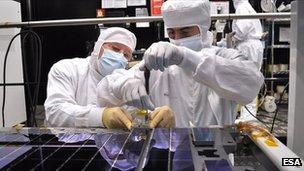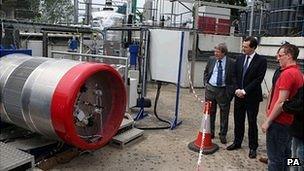UK 'needs national space programme'
- Published

British companies produce some world-leading space technologies
If the UK space sector is to build on the progress of recent years, it needs a defined and properly funded national space programme, a report says.
It is one of the key messages to come out of a review of an industry that has been growing by an average of more than 7% a year, even through the recession.
The Space Innovation & Growth Strategy (IGS) sets out a plan to boost exports from £2bn to £25bn per annum by 2030.
But to achieve this, the report says, state support needs more coherence.
"I don't want this to be a criticism of government because they have done some incredible things for space of late, but we have been doing these things piece by piece," explained Andy Green, the co-chair of the UK Space Leadership Council.
"It's time now that we take a long-term view on our technologies and the bi-laterals we have with other space nations, and make available a pool of funding over, say, the next five years that has some certainty.
"That will give us best value for money; the most bang for our buck," he told BBC News.
The majority of the civil space budget in the UK (nearly £300m) ends up being spent on programmes organised through the European Space Agency. A relatively small sum is spent on exclusively home-grown initiatives, and very often that money is delivered as one-offs to support special projects - such as the £60m announced in June for the Sabre air-breathing rocket engine being developed by Reaction Engines Ltd.
This is in contrast to Germany, France and Italy - the other big space players in Europe - who have robust national programmes in addition to their Esa participation.
The IGS report sets out a Space Growth Action Plan that it believes can lead to a thriving environment for space businesses in the UK - particularly for small and medium enterprises, or SMEs.
It is a call to industry to reach out into the wider UK and the global economy to sell the opportunities that exist in space applications, data and services.

The IGS wants multi-year commitment rather than piecemeal funding of particular projects
The hope is that new ideas and new markets can boost demand, drive technological innovation and further amplify the already healthy growth in the sector.
To achieve this, however, requires that the right sort of ecosystem is put in place.
The IGS wants the government to champion the absolute best regulatory and licensing arrangements, to ensure both that indigenous companies flourish but also that foreign concerns are persuaded they need to invest more in Britain.
One way the IGS believes this could be done is by government backing the necessary legal framework to permit a spaceport to be set up in the UK.
Andy Green: "We want a 10% share of the global market"
This might entice the new breed of launcher companies now offering lower-cost access to space to start operating services in Britain to the benefit of the home industry.
The report sets a target of 2018 for the spaceport to be established.
The IGS 2014-2030 report is a reboot of a study that was prepared for the previous Labour government but which was also enthusiastically endorsed by the current coalition when it came to power.
Many of the initial recommendations were acted upon, but the latest report says it is still waiting for the government to publish a National Space Policy. And congruent with such a policy would be a strong National Space Growth Programme to sit alongside the country's contribution to Esa, the IGS argues.
"Many elements of this programme already exist and therefore its creation does not necessarily require a large increase in government spending," the document reads. "It does however call for a strategic approach driven by the National Space Policy and a multi-year commitment."
The Space IGS is a document produced principally by and for industry to help it focus its future goals, but it is presented to government because the state's financial muscle makes it a very important player in the market.
David Willetts is the minister responsible for space. He said the coalition would produce a formal response in the new year, but added there was much to admire in the new document.
"What I like about this report is that it is optimistic, forward-looking and ambitious," Mr Willetts told BBC News.
"It is right to pick up that there are lots of sectors out there - both private and public - who don't realise just how dependent they already are on space services and how much more use they could be making of satellite applications in the future. That's a really important theme."
Jonathan.Amos-INTERNET@bbc.co.uk and follow me on Twitter: @BBCAmos, external
- Published28 October 2013
- Published16 July 2013
- Published21 November 2012
- Published21 November 2012
- Published27 January 2012